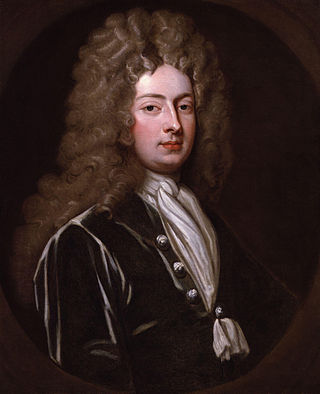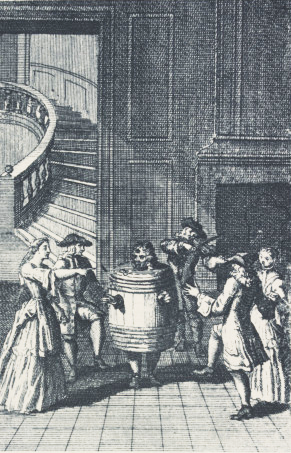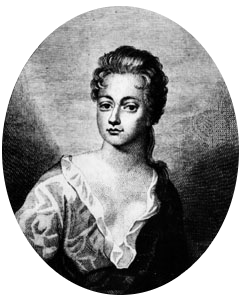Related Research Articles

William Congreve was an English playwright, poet and Whig politician. His works, which form an important component of Restoration literature, were known for their use of satire and the comedy of manners genre. Notable plays he wrote include The Old Bachelor (1693), The Double Dealer (1693), Love for Love (1695), The Mourning Bride (1697) and The Way of the World (1700) which established him a great writer in the genre of comedy of manners. He died in London, and was buried at the Poets' Corner in Westminster Abbey.

Restoration comedy is English comedy written and performed in the Restoration period of 1660–1710. Comedy of manners is used as a synonym for this. After public stage performances were banned for 18 years by the Puritan regime, reopening of the theatres in 1660 marked a renaissance of English drama. Sexually explicit language was encouraged by King Charles II (1660–1685) personally and by the rakish style of his court. Historian George Norman Clark argues:
The best-known fact about the Restoration drama is that it is immoral. The dramatists did not criticize the accepted morality about gambling, drink, love, and pleasure generally, or try, like the dramatists of our own time, to work out their own view of character and conduct. What they did was, according to their respective inclinations, to mock at all restraints. Some were gross, others delicately improper.... The dramatists did not merely say anything they liked: they also intended to glory in it and to shock those who did not like it.
This article contains information about the literary events and publications of 1704.
This article contains information about the literary events and publications of 1705.
This article contains information about the literary events and publications of 1706.
This article contains information about the literary events and publications of 1701.
This article contains information about the literary events and publications of 1698.
This article contains information about the literary events and publications of 1697.
This article contains information about the literary events and publications of 1696.
This article contains information about the literary events and publications of 1695.
This article contains information about the literary events and publications of 1693.
This article contains information about the literary events and publications of 1692.
This article presents lists of the literary events and publications in 1664.

In March 1698, Jeremy Collier published his anti-theatre pamphlet, A Short View of the Immorality and Profaneness of the English Stage; in the pamphlet, Collier attacks a number of playwrights: William Wycherley, John Dryden, William Congreve, John Vanbrugh, and Thomas D'Urfey. Collier attacks rather recent, rather popular comedies from the London stage; he accuses the playwrights of profanity, blasphemy, indecency, and undermining public morality through the sympathetic depiction of vice.

Anne Bracegirdle was an English actress and soprano. Most of the plays she performed in involved singing as well as acting. She often performed music written for her by the composer John Eccles, and also sung music written for her by Henry Purcell. She became particularly well known for the song "I burn" which Eccles originally wrote for Bracegirdle to perform in Thomas D'Urfey's play The Comical History of Don Quixote (1694). She also sang music by Eccles in the play The Richmond Heiress (1693) and in William Congreve opera The Judgment of Paris. In 1706 she starred in Giuseppe Fedeli's opera The Temple of Love.

Restoration literature is the English literature written during the historical period commonly referred to as the English Restoration (1660–1688), which corresponds to the last years of Stuart reign in England, Scotland, Wales, and Ireland. In general, the term is used to denote roughly homogenous styles of literature that centre on a celebration of or reaction to the restored court of Charles II. It is a literature that includes extremes, for it encompasses both Paradise Lost and the Earl of Rochester's Sodom, the high-spirited sexual comedy of The Country Wife and the moral wisdom of The Pilgrim's Progress. It saw Locke's Treatises of Government, the founding of the Royal Society, the experiments and holy meditations of Robert Boyle, the hysterical attacks on theatres from Jeremy Collier, and the pioneering of literary criticism from John Dryden and John Dennis. The period witnessed news becoming a commodity, the essay developing into a periodical art form, and the beginnings of textual criticism.
Nationality words link to articles with information on the nation's poetry or literature.
John Dryden (1667/8–1701) was an English writer. He was the second son of the poet John Dryden (1631–1700) and was educated at Westminster School and University College, Oxford. He translated Juvenal's fourteenth satire, and wrote one comedy.
Joseph Williams was an English stage actor of the seventeenth and early eighteenth century.
Elizabeth Bowman was an English stage actress of the seventeenth and early eighteenth century. The daughter of Sir Francis Watson, 1st Baronet she was adopted by the actor manager Thomas Betterton. In 1692, she married John Bowman and began acting at Drury Lane the following year as Mrs Bowman. She was a member of the United Company until 1695 then joined Betterton's breakaway at the Lincoln's Inn Fields Theatre.
References
- ↑ James Henry Monk (1830). The Life of Richard Bentley, D.D., Master of Trinity College... p. 113.
- ↑ Williams, Hywel (2005). Cassell's Chronology of World History . London: Weidenfeld & Nicolson. pp. 289. ISBN 0-304-35730-8.
- ↑ Hochman, Stanley. McGraw-Hill Encyclopedia of World Drama. Vol. 4. p. 542.
- 1 2 3 4 5 6 7 8 9 10 11 12 13 14 15 16 17 18 19 20 21 22 23 24 Cox, Michael, ed. (2004). The Concise Oxford Chronology of English Literature . Oxford University Press. ISBN 0-19-860634-6.
- ↑ "Fama y obras posthumas del Fenix de Mexico, decima musa, poetisa americana, sor Juana Ines de la Cruz". Biblioteca Virtual Miguel de Cervantes. Retrieved 3 March 2019.
- ↑ Thompson Cooper (1873). A New Biographical Dictionary... Bell. p. 544.
- ↑ Carlos A. Solé; Maria Isabel Abreu (1989). Latin American Writers. Charles Scribner's Sons. p. 74. ISBN 978-0-684-18463-0.
- ↑ George Crabb (1833). Universal Historical Dictionary: Or Explanation of the Names of Persons and Places in the Departments of Biblical, Political and Eccles. History, Mythology, Heraldry, Biography, Bibliography, Geography, and Numismatics. Baldwin and Cradock. p. 5.